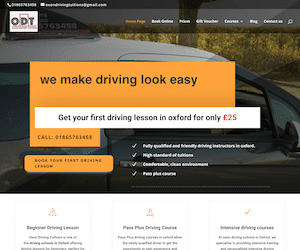If you’re in the market for a new website, you’ve undoubtedly heard WordPress mentioned quite a bit. Which means you’ve probably found yourself wondering, “what is WordPress anyway?”
WordPress is a full-featured content management system that just happens to be the world’s most popular tool for creating websites. In fact, it’s so popular that over 38% of all websites are built with WordPress. The reasons for that massive popularity require a little more explanation.
Is WordPress Easy To Use?
Do you say you’ve never built a website before? That’s not a problem! With WordPress, you don’t need to know a thing about HTML, CSS, or any other acronyms that professional web developers love to toss around.
You don’t need to be a designer either. There are thousands of free WordPress site designs to choose from. These pre-made templates are known as “themes” in the WordPress world.
With WordPress, it’s easy to build a professional-looking website without writing a single line of code.
What Type Of Websites Can I Make With WordPress?
WordPress can power virtually any kind of website, from a simple blog to a full-featured business website. You can even use WordPress to create an online store by using the popular WooCommerce plugin.
WordPress is easy enough that anyone can use it. It’s also deep enough that many web professionals choose WordPress as the starting point for custom websites.
Some of the most popular websites in the world are built with WordPress. Take a look at the WordPress Website Showcase, and you’ll see everyone from The New York Times Company to The Rolling Stones using WordPress. WordPress is used widely across nearly every industry, including non-profits.
How Does WordPress Work?
WordPress is what they call a content management system (CMS). You can think of it as being something like an operating system for your website. When you use WordPress, you’re free to use any of the thousands of add-ons that have been created for WordPress.
The WordPress system runs on a web server (your web hosting account). You access WordPress from a computer or mobile device with a standard web browser. Because WordPress does the hard work, no special software is required for you to build and manage your WordPress website.
Under the hood, WordPress uses a database server (MySQL) to store your content and site settings, and a web server (typically NginX or Apache) to deliver your web pages to your site visitors. The core WordPress application is programmed in PHP and JavaScript.
But don’t let these technical details scare you. You don’t need to know a thing about these related technologies to use WordPress. WordPress shields you from ever having to know about things like SQL. But if you’re the sort of person who likes to tinker,
What’s The Difference Between WordPress.com and WordPress.org?
Before we go any further, it’s important to note that there are two different WordPress versions.
WordPress.com is the hosted version of WordPress. That means your website runs on the official WordPress servers. You can go to WordPress.com right now and create a website for free.
There are some limitations to using WordPress.com. You won’t have access to all of the thousands of themes that are available.
And unless you pay for a WordPress Business account, you can’t use WordPress plugins. Plugins are add-ons that add special features to your website. There’s also a fee if you want to use your own domain name on WordPress.com.
WordPress.org is the self-hosted version of WordPress. This is the version you’ll use to run WordPress on your own web hosting account. When you use this version, you have complete control over the design and functionality of your site. You can use whatever theme you like and install any plugin with no limitations.
The good news is that there’s no lock-in with WordPress. If you start on .com and decide you like WordPress so much that you want to take full advantage of everything it has to offer, you can move to a self-hosted .org site later.
Check this video tutorial for a more in-depth analysis of choosing WordPress.com vs. WordPress.org.
Is WordPress Free?
WordPress is free to use and free to modify. You also have access to the full source code. If you are the sort of person who likes to tinker with code, you can dig in and make WordPress do just about anything you want it to do.
WordPress is distributed under an open-source software license known as GPL. That license ensures that WordPress remains free and that site owners maintain complete control and ownership of their web creations.
Unlike other “free” website tools, WordPress does not lock site owners into a proprietary service like Wix, Weebly, or Squarespace.
You can host your WordPress website anywhere. And if you’re not happy with your WordPress host, you can move your site to another hosting service anytime you like.
How Do I Learn WordPress?
There are plenty of ways to learn how to use WordPress. There’s something for everyone regardless of your preferred learning style from the many books available to online courses, and local training sessions.
WP Apprentice offers a free WordPress course that features a selection of0 our most popular lessons. Our video tutorials will teach you the WordPress basics in about an hour. You’ll be creating web pages like a pro in no time. When you’re ready to expand your knowledge, we offer beginner-friendly WordPress courses for every challenge you’re likely to face.
How Do I Download WordPress?
You can download WordPress from WordPress.org, but you probably won’t need to. Most web hosts offer one-click WordPress installation from their web control panels.
Unlike traditional desktop software, WordPress runs online (in the cloud, so to speak). There’s nothing to install on your computer, and you don’t need any special tools. You can update your website from anywhere that you have an Internet connection – even your smartphone. There are even free WordPress mobile apps for iPhones and Android phones.
Can I Install WordPress On My Personal Computer?
I’ve mentioned that WordPress is a special type of software that runs on a web server. But that doesn’t mean you can’t install WordPress on your personal computer. It does mean you’ll have to install all of the related technologies that WordPress needs to do its thing.
There are plenty of reasons why you might want to install WordPress on a PC. Perhaps you’d like to get some hands-on experience before signing up for a web hosting account. Or maybe you want a safe space to experiment with your existing website, without fear of breaking it.
Whatever the scenario, I recommend a free tool called Local that allows you to install WordPress on your Mac or PC. We have more instructions on how to set up Local in our Quick Start course.
How Do I Get WordPress Support?
As WordPress’s popularity continues to grow, the community of users and fans is expanding rapidly.
Thanks to its vast open source community, there are plenty of places to get WordPress help when you need it. Both WordPress.org and WordPress.com offer support forums.
Independent training websites (like WP Apprentice) provide support to members. And, of course, there are hundreds of WordPress books to guide you on your WordPress journey.
And if you’d like to connect with the WordPress community in your area, check to see if there’s an upcoming WordCamp event near you. WordCamps are one of the best ways to make connections with WordPress experts in your area.
Now that you’ve had a thorough introduction to WordPress, what are you waiting for? It’s time to get started on your WordPress journey.



